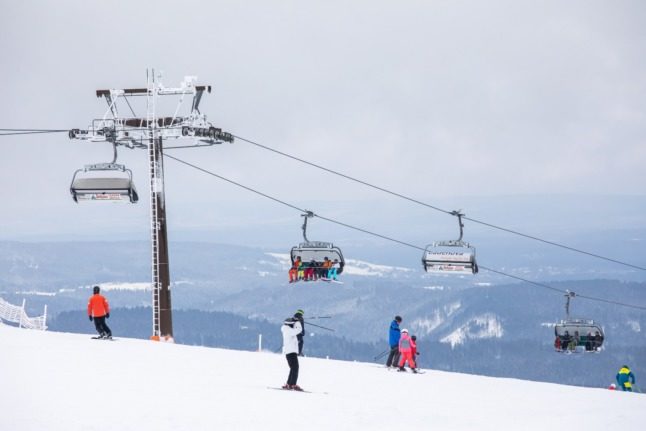Bavaria
At the beginning of December, the Bavarian Council of Ministers abolished the 2G-plus rule in ski resorts, which required skiers to be vaccinated or recovered, as well as providing proof of a negative Covid test.
Since then, a 2G rule has been in place on cable cars and other lift facilities – meaning access is permitted only for those who are vaccinated or recovered.
Children under the age of 14 do not require proof of 2G and the same exception applies to young people up to 17 years of age until January 12th, upon presentation of their student ID.
Cable cars that seat more than ten people may only operate at a maximum capacity of 25 percent, while smaller cars may operate at up to 75 percent capacity. No capacity restrictions apply for open-air cable cars.
READ ALSO: What Covid rules are in place for the ski season across Europe?
Hotels and restaurants
The 2G rule also applies to accommodation establishments and restaurants in Bavaria – meaning only vaccinated and recovered visitors will be able to stay. Guests are also required to wear FFP2 masks in common areas. The same exceptions for young people also apply in hotels and restaurants.
Baden-Württemberg
2G-plus rules have been in place for skiing in the Black Forest in Baden-Württemberg since December 27th.
Here, cable cars and ski lifts are only open to vaccinated and recovered people who can also provide a negative antigen test.
Exempt from the test requirement are people with a booster vaccination, everyone whose second vaccination or recovery certificate is no older than three months, and schoolchildren, younger children and young people up to 17, as well as pregnant women in the first trimester of pregnancy.
Hotels and Restaurants
In Baden-Württemberg, alert level II is currently in effect. In alert level I and II, it is no longer possible to stay overnight in hotels without 2G status. and 2G+ applies in gastronomy and hotel catering. This means that even vaccinated and recovered people must present a negative rapid or PCR test, unless they have already received their booster no longer than three months ago. There is also a 10:30pm to 5am curfew for restaurants.

Empty hangers hanging on a ski lift. Photo: picture alliance/dpa/dpa-Zentralbild | Sebastian Kahnert
Saxony
In Saxony – one of the German states worst affected by the fourth wave – a Covid emergency ordinance is in force until January 9th.
This means that overnight stays for tourists are not allowed and the state’s ski resorts are closed.
Rhineland-Palatinate
The Erbeskopf ski resort in Rhineland-Palatinate is not currently open as it is still awaiting sufficient snowfall, but 2G-plus rules are planned – with vaccinated and recovered visitors having to wear FFP2 masks on the lifts and in the ski rental shops.
Skiers will also have to register online before their visit as only one slope will be open, meaning the number of tickets will be limited.
Hotels and Restaurants
Access to indoor catering and hotels is only possible for vaccinated or recovered people or those who also have a current negative test certificate (2G-plus regulation). People with a booster vaccination do not need proof of testing, and schoolchildren, younger children and adolescents up to 17 years of age are exempt.
Hesse
In the Ski resort of Willingen, the 2G rule (access only for vaccinated and recovered people) applies throughout the ski area, except for children and teenagers.
Mouth and nose protection in the form of an FFP2 mask or a medical mask must be worn in the ski rental areas, in the ticket office and cable car area, as well as in all means of transport (cable cars, chair lifts, T-bar lifts, etc.). There are no exceptions to this rule.
Hotels and Restaurants
The 2G rule also applies to accommodation establishments and restaurants in Hesse – meaning only vaccinated and recovered visitors will be able to stay. Guests are also required to wear a medicinal masks in common areas.



 Please whitelist us to continue reading.
Please whitelist us to continue reading.
Member comments